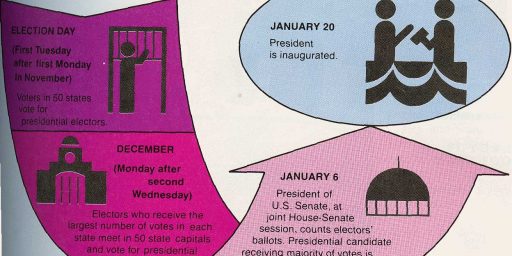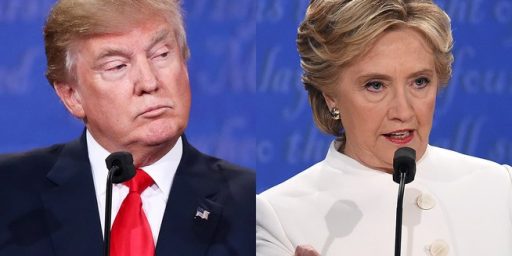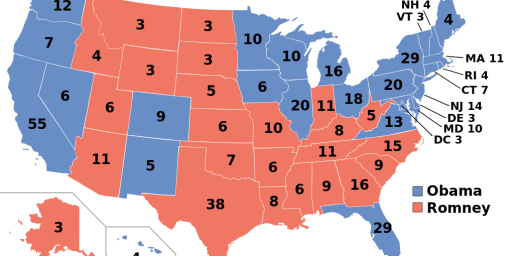California Electoral College Reform
The move by California Republicans to join Maine and Nebraska in allocating the state’s Electoral College votes to the winners of each Congressional District rather than statewide is moving forward at a fast pace, with a new Field poll showing that it has a decent chance to pass.
The Field Poll found that 47 percent of registered voters back a change to California’s system for electoral votes, with 35 percent opposed. Republicans generally support the change more than Democrats.
When pollsters explained the political implication that Democratic presidential candidates might lose some electoral votes under a proportional system, the numbers changed: 49 percent supported the change and 42 percent opposed it. Opposition from Democrats and independent voters rose when the issue was put this way.
That the level of support went up (although, granted, within the margin of error) when the partisan implications were explained is somewhat odd. While California is a diverse state that’s more conservative than those who look only at L.A. and San Francisco think, it has still voted Democrat in every presidential election since 1992.
The state’s Democrats are countering with a move to join the National Popular Vote movement.
The national drive toward a popular vote would not scrap the electoral college system, but would require states to award their electoral votes to whichever candidate wins the most actual votes nationally. It would take effect only if states representing a majority of the electoral votes agree to the change.
Although California is a Democratic state, Republicans hold 19 congressional seats, suggesting that the GOP presidential nominee could win at least 19 of the state’s electoral votes. A Field Poll released this week showed that the GOP-backed concept was supported by a ratio of 47% to 35%.
There is no definitive count of voter registration by party. Some states don’t ask party affiliation. But based on a recent Times/Bloomberg poll, 33% of voters nationally identified themselves as Democrats, 28% said they were Republicans, and the rest said they belonged to minor parties or declined to state.
Kevin Eckery, spokesman for the GOP measure, said the Democratic-backed initiative would leave Californians with little or no voice in U.S. politics. “If you ignore the congressional districts, there would be one big overwhelming national vote,” he said. “What matters in L.A. . . . won’t matter. It will be just one vote thrown into the mix.”
That depends on how one looks at it. While motivated strictly by partisan considerations, California Republicans have a point: Right now, the state is a cash cow for presidential candidates but it’s virtually ignored because it’s considered a Democratic lock. Giving 19 or so of California’s Electoral Votes to Republicans would, of course, be a huge boon for the GOP but it would also make campaigning in the state — at least in swing districts — more appealing.
On one hand, both the Democratic and Republican initiatives would make California less powerful as a state in choosing presidents. The Republican plan, at least, has the virtue of making Californians as people more important in the process. The Democratic plan would indeed just amalgamate California into the larger pot. Its gigantic population, though, would continue to have a huge influence in electing a president.






If every state followed the California proposal it might work out to be a good reform.
But as long as only selected states implement this policy it would function strictly as a method for increasing the electoral vote for one party.
Would you favor Texas and other southern states implementing this policy while California and the Northeastern states did not?
That would certainly be the aggregate national impact. From the state’s perspective, though, it could make sense. For one thing, winner-take-all disenfranchises a sizable minority in this case. For another, “California issues” totally get ignored under the present system.
I would think that a “popular vote” nationwide would benefit the larger states, as more political attention prior to an election would probably also mean more favors and gov’t programs directed to those areas to garner favor. The GOP in this example could still lose Calif. but get several million more popular votes in doing so.
Large population areas would be the big winners in a nationwide popularity voting structure and lesser populated areas would lose ground politically.
Spencer, It’s not a hypothetical question. Take a look at North Carolina. The state’s Democratic leaders were about to get it through the state legislature until Howard Dean intervened and got it postponed.
James, I think a lot of people looking at this issue (the California/NC one) are overlooking a rather obvious flaw: if it’s done by congressional district, gerrymandering battles will become ten times more contentious and will determine not only control of the House but also the presidency. A Democrat could win the vote in Florida but still lose its delegation 16-9 or 14-11 because of how the congressional districts are drawn up. Bush could have lost a majority of Texas’s delegation in 2000 as they sent 19 Democratic reps and 13 Repubican reps (or something like that) to the House that year.
In regards to the de facto canning of the electoral college, I’m curious how would recounts work. I’m not saying that a workable system couldn’t be developed, but it would add a layer of weirdness if there are some states that participate and others that do not. Getting rid of the EC formally would streamline that (recount everywhere) for better or worse. Getting rid of it this way could make some aspects of the system even more complicated and weird than they are now.
In 2000 and 2004, my presidential election vote did not count. I voted, it was tallied, but it was all moot as I vote in Texas. A change like this would hurt the GOP, but it would more likely put my vote in play.
Now looking at this from 2004 perspective. Bush won 250 congressional districts and Kerry won 165 (not sure what is up with the missing 20 congressional districts). Add in the 31 states for Bush, 19 states for Kerry, 3 EV for district of Columbia to Kerry and the end result would be 312 EV for Bush and 206. Even if all the missing congressional districts went to Kerry, the end EV result would have been further for Bush than the actual result of 286 to 252.
Go back to 2000 and we see something similar. 226 congressional districts for Bush, 209 for Gore. 30 states for Bush, 20 states for Gore and DC for Gore. Net result is 286 EV for Bush, 252 EV for Gore, which is again better than the actual result of 271 to 266.
I couldn’t find congressional district information for earlier years.
So to spencer’s point, selected states doing this could certainly have moved the last couple of elections, but doing it nationally wouldn’t have moved 200 or 2004. It would mean that the “battle ground” becomes broader.
Your vote didn’t matter in any other year either. Neither did the votes of 300 million other americans. The popular vote is meaningless since presidents are only elected by the electoral college.
If you want your vote to actually matter you have to do with the EC altogether.
If we are going to keep the EC I do like the idea of reducing the granularity by using the county level, but as above that needs to be done by all states, not just one.
tlaloc,
The reason my vote didn’t count wasn’t because I am not in the EC, but because there was no contest in my state. In 2004, there were 2 states (NM and Iowa) where the victory difference was less than 1%. In 2000, there were 5 states (FL, IA, NM, OR, WI ) with a difference less than 1%. In Florida, it was 537 votes that decided those EC votes. NM was 366 vote difference.
What I am saying is that states which are ‘reliable’ for one party or another also mean they aren’t courted in the election because swaying 1% of the voters doesn’t matter. On the up side, we don’t have quite as many election ads.
To say your vote doesn’t count because of the EC is to say that your vote doesn’t count for congress critter because you don’t get to vote directly on the legislation. Suck it up, is called representative democracy.
While this is, on the surface, true, the main contention that there’s a problem with the current system is that the 2000 election brought the wrong candidate (i.e., the candidate that won fewer actual votes) to office. What you’ve described is that a system based on constitutional districting actually exacerbates that problem. Therein lies one serious flaw in the Republican proposal as it stands (the others being that it that the only true motivation is partisan, and that such a system implemented on a peacemeal basis, as R. Alex points out, will only add layers of complication and error to an already seriously broken system).
This is the stated reason for keeping the EC. Two criticisms. First, why is it bad that one person should have one vote? As it stands, a person voting in Wyoming has significantly more impact than a person voting in California, even though California has a much larger aggregate impact due to its obviously higher population. Second, does the system as it exists really benefit smaller states? Sure, they get face time, but how does the president really pay back Idaho (or Rhode Island)?
At any rate, until Texas and Georgia go the way of assigning their electoral votes proportionally, this is doomed to failure, as well it should be. We have to eliminate the EC on a national level, and until the National Popular Vote movement gets enough steam, I don’t see it happening.
The Democrats have shown themselves to be hypocrites with their criticism of the Republican proposal given what was going on in North Carolina and the Colorado initiative backed by a California Democrat that was defeated a few years back, both of which would have done much the same kind of thing as the Republican proposal, only to the benefits of Democrats.
That said their self-interest in defeating the Republican initiative in California has prompted them to back the plan devised by the Stanford professor, which uses an interstate compact to create a de facto popular election without having to do the practically impossible task of pushing through a constitutional amendment.
I think the public will largely back this but it still won’t come into being for a while since it doesn’t happen until that majority electoral vote state threshold is reached. States having almost half the electoral votes allow initiatives, so most of it could be done through submitting it directly to the voters of those states. That could create enough momentum in the remaining states to finish the job.